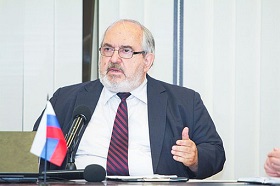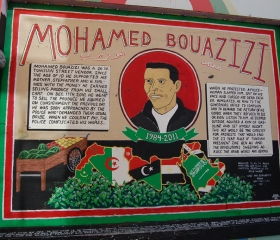Interview
In the run-up to the Geneva-2 conference, Petr V. Stegniy, Russia’s Ambassador Extraordinary and Plenipotentiary and a RIAC member, shares his views on the Syrian crisis and possible ways to resolve it.
Interview
In the run-up to the Geneva-2 conference, Petr V. Stegniy, Russia’s Ambassador Extraordinary and Plenipotentiary and a RIAC member, shares his views on the Syrian crisis and possible ways to resolve it.
Mr. Ambassador, is there any room for compromise among world powers on the Syrian crisis and its resolution at Geneva-2?
Geneva-2 seems to suit the leading world powers, the Syrian regime and the internal opposition that participates in the Syrian government. There are, however, other opposition groups, both in the secular community and among the militants, and they are not united on this issue, nor are they united on a whole range of other issues on the national agenda.
Given these circumstances, what are the chances that this conference will, eventually, be convened? I am still inclined to think that it will be, and one wants to hope that this will happen within the timeframe indicated by the U.S., i.e in late November.
The general rationale of the Arab Spring suggests that there is no alternative to addressing internal issues through dialogue. The two and a half years of civil war seem to have demonstrated that the Syrian issue cannot be resolved through force. This is something that should have been realized long ago by those who seem unable to overcome their own phobias and sit down at the negotiation table. It is no secret that the strategy pursued by the opposition, including its radical wing, which is funded by the oil-producing Gulf monarchies, was based on the US carrying out a military strike against Syria. Now, with the agreement on Syrian chemical weapons in place, there is a good chance of a political and diplomatic solution of the issues that are central to global and regional policy. I am not only talking about the destruction of chemical war arsenals in Syria, although this could have had a sanitizing effect on Bashar Assad’s regime and on WMD proliferation more broadly. Geneva-2 has a different overarching mission: to prevent Syrian statehood from being undermined, and thus avoid a humanitarian disaster. This is the objective that must be shared by all parties to the Syrian conflict and around it.
What decisions can be expected from Geneva-2? What can be done to help or impede them?
At this point in time everybody is working to convene the conference. Whether or not they will succeed will become clear after the meeting between the U.S. State Secretary, John Kerry, and representatives of the Syrian opposition in London.
As for possible solutions, I would not want to look ahead too much: this is for the parties to the Syrian conflict to decide. Russia’s principled position is that no solutions can be imposed on the situation in the absence of proper arrangements between the parties directly involved in this conflict. They simply won’t work. The international community could push forward some processes, and provide assurances as to their implementation, but the compromise itself, concessions and reciprocal steps that both parties would have to make are totally up to them.
Preparations for Geneva-2 are affected by the changing alignment of the regional powers. The ousting of the Muslim Brothers from power in Egypt in the July 3 military coup led to a second phase of the Arab Spring. During phase one, failing regimes, in conflict with modernity, were brushed aside. During phase two, the pressing objective is to consolidate the nation in order for it to be able to address the complex economic, social and political issues that confront it.
However, so far there has been no obvious political force that seems able to assume this consolidating role. The U.S. experiment of trying to influence the Muslim Brothers has failed, leading, as one of its consequences, to a revival of radical Islamists. It is still difficult to predict how long it will take, in the circumstances, for a party or a charismatic leader (a new Gamal Abdel Nasser) to emerge, or indeed anyone who could bring a unifying idea for the nation or the region.
The impression is (and not only for Egypt but Syria, too) that, given real social disarray across the Arab world, the army can still, for a time, play a consolidating role. Here a great deal will depend on developments in Egypt. If the road map is observed, and the country is firmly set on its path to democracy under the army’s “umbrella,” this example can then be emulated, I think, in a number of other countries. But there are all sorts of other possible scenarios.
At a time when the most pressing objective is to build a new economy and a new society, much will depend on the financial support that only oil-rich Gulf states can offer. For this, and for a number of other reasons, these states are now moving to the forefront of regional politics, and it remains unclear precisely what kind of role they will play. The alignment of regional forces is something that can, potentially, either slow down or boost future developments, including efforts to convene Geneva-2.
Interviewed by Daria Khaspekova, Programme Coordinator





